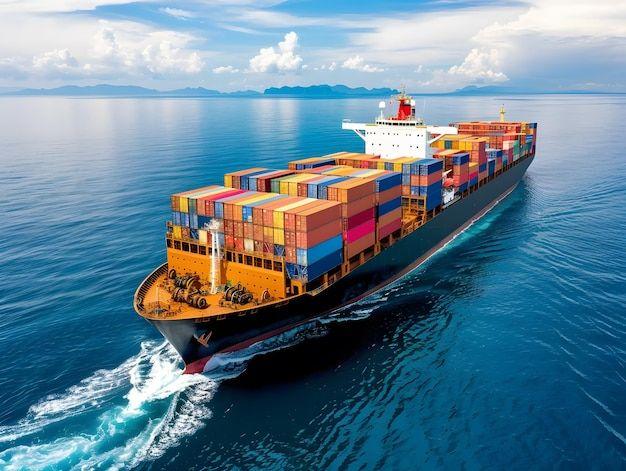In the fast-paced world of defense and maritime operations, the backbone of mission readiness lies not just in advanced ships and well-trained personnel but in a less-glorified yet critical domain Fleet Logistics Support.
So, how can fleet logistics support improve operations? The answer spans across strategic supply chain efficiency, enhanced mission sustainability, better resource management, and reduced operational downtime. Whether in naval defense, commercial shipping, or offshore oil sectors, effective logistics support serves as the invisible force that keeps vessels moving and missions succeeding.
Understanding Fleet Logistics Support
At its core, Fleet Logistics Support refers to the systematic planning, implementation, and coordination of all logistical needs of a fleet—whether it's a naval group, commercial cargo carriers, or oil rig support ships. This includes provisioning fuel, ammunition, spare parts, food, water, medical supplies, and maintenance services, often while ships are still at sea.
Efficient logistics support ensures that a vessel or an entire fleet maintains its operational tempo without needing to return to port unnecessarily. This capability is especially crucial in combat operations, humanitarian relief, and global commercial shipping where time and readiness are everything.
1. Enhanced Mission Readiness and Mobility
One of the clearest answers to the question, how can fleet logistics support improve operations, lies in ensuring continuous mission readiness. Fleets with robust logistical support can remain deployed for longer periods without compromising their operational effectiveness.
Modern naval operations, for example, involve multi-domain combat environments. Ships must stay mission-ready for extended durations. Fleet logistics units—through underway replenishment, aerial supply drops, or rapid port resupply—enable ships to function with agility and minimal interruption. This enhances mobility and tactical flexibility, crucial elements in today’s unpredictable threat landscape.
2. Reduced Downtime and Delays
Downtime for any vessel is a costly affair. In commercial fleets, it can mean delayed deliveries, contractual penalties, and revenue losses. In defense, it can mean vulnerability and reduced force projection. Fleet logistics support bridges the gap by delivering just-in-time supplies, maintenance parts, and technical support to ships in transit or operation.
For instance, predictive maintenance logistics—using IoT and AI to forecast component failures—allow fleets to receive necessary parts before breakdowns occur. This proactive approach reduces unscheduled downtime, ensuring smoother operations across the board.
3. Better Cost Efficiency Through Optimized Supply Chains
Fleet logistics support isn't just about delivering materials—it’s about delivering them intelligently. By using centralized fleet tracking, dynamic route planning, and integrated inventory systems, logistics teams optimize supply chains to ensure minimum wastage and maximum utilization.
Consider a scenario where multiple ships operate in different oceans but require similar provisions. A centralized logistics command can consolidate requests, dispatch a supply ship on an optimized route, and reduce fuel consumption and redundancy. Over time, this leads to massive cost savings and better environmental compliance.
4. Strengthened Interoperability and Joint Operations
Modern military and commercial operations often require collaboration between international partners or joint-force coalitions. Fleet logistics support plays a key role in these alliances by enabling interoperability.
A U.S. Navy ship might need refueling from an allied fleet tanker or vice versa. Standardized logistics protocols, interoperable systems, and shared support assets enable such operations to happen seamlessly. This is particularly vital during NATO exercises, disaster relief missions, or multinational commercial ventures.
5. Scalability and Adaptability in Emergencies
Fleet logistics support is not static. It’s dynamic and can scale based on mission intensity or humanitarian needs. In times of natural disasters, wars, or pandemics, logistics units are often the first responders—delivering aid, supplies, and personnel to affected regions.
The adaptability of these support systems ensures fleets can shift roles quickly—from combat readiness to humanitarian relief—without compromising efficiency. This mission agility is a testament to the power of effective logistics.
6. Leveraging Technology for Future Operations
The evolution of fleet logistics support is deeply tied to technological advancements. Drones for ship-to-ship delivery, autonomous logistics vessels, AI-powered forecasting systems, and blockchain-based inventory tracking are reshaping how fleets are supplied and maintained.
In the future, real-time visibility across all fleet assets, AI-led route optimization, and autonomous replenishment may become the norm, drastically improving operations and safety margins.
Conclusion: Logistics Is the Lifeline of Operational Success
To wrap it up, the answer to "How can fleet logistics support improve operations?" is multifaceted: it maximizes mission endurance, minimizes delays, enhances interoperability, and drives strategic cost savings.
Whether you’re managing a naval defense fleet or a global shipping enterprise, logistics support isn’t an afterthought—it’s a critical enabler of success. As the world moves toward increasingly complex maritime operations, those who invest in smart, adaptable fleet logistics systems will lead the charge—efficiently, safely, and ahead of time.

